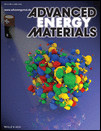
Advanced Energy Materials
Scope & Guideline
Advancing Knowledge for a Greener Future
Introduction
Aims and Scopes
- Energy Storage Technologies:
Research on materials and systems for storing energy, including lithium-ion, sodium-ion, and next-generation batteries. This encompasses advancements in electrode materials, electrolytes, and interface engineering. - Photovoltaics and Solar Energy:
Development of new materials and technologies for solar energy conversion, including organic photovoltaics, perovskite solar cells, and tandem solar cells, aiming for higher efficiency and stability. - Electrocatalysis and Fuel Cells:
Investigations into electrocatalytic processes for energy conversion, including hydrogen production, CO2 reduction, and ammonia synthesis, focusing on the design of efficient catalysts and membranes. - Thermoelectrics:
Research on materials that convert temperature differences into electrical energy, exploring novel materials and device architectures to enhance thermoelectric efficiency. - Sustainable and Green Energy Materials:
Development of environmentally friendly materials and processes for energy applications, including bioinspired and recyclable materials, with a focus on reducing the carbon footprint of energy technologies. - Nanomaterials and Hybrid Systems:
Exploration of nanostructured materials and hybrid systems that enhance energy performance through improved charge transport, light absorption, and chemical reactivity.
Trending and Emerging
- Solid-State Batteries:
There is a significant increase in research on solid-state batteries, focusing on the development of solid electrolytes and interfaces that enhance safety and energy density. - Organic and Perovskite Solar Cells:
Emerging interest in organic and perovskite solar cells is evident, with studies focusing on improving efficiency, stability, and scalability of these next-generation photovoltaic technologies. - Multifunctional Electrocatalysts:
Research on multifunctional electrocatalysts for various electrochemical reactions, including CO2 reduction and water splitting, is trending as the demand for efficient energy conversion technologies grows. - 2D Materials and Heterostructures:
The use of two-dimensional materials and their heterostructures is gaining traction due to their unique properties, which enhance performance in applications ranging from batteries to catalysis. - Bioinspired and Sustainable Materials:
There is a growing focus on bioinspired materials and sustainable practices in energy storage and conversion, aligning with global sustainability goals and environmental concerns. - Machine Learning and AI Applications:
The integration of machine learning and artificial intelligence in materials discovery and optimization is emerging as a significant trend, enhancing the efficiency of research and development processes.
Declining or Waning
- Conventional Lithium-Ion Battery Research:
As the field matures, the emphasis on lithium-ion battery research has shifted towards more innovative and sustainable alternatives, such as sodium-ion or magnesium-ion batteries. - Traditional Photovoltaic Materials:
Research on traditional silicon solar cells is waning as the focus increasingly turns to perovskite and organic photovoltaics, which offer higher efficiencies and lower production costs. - Amorphous Semiconductor Research:
Interest in amorphous semiconductors has decreased as newer materials, particularly 2D materials and perovskites, gain traction for energy applications. - Basic Theoretical Studies:
While theoretical modeling remains important, there is a noticeable decrease in purely theoretical studies without experimental validation, as applied research becomes more prioritized. - Single-Use Battery Technologies:
Research on single-use batteries is declining as the focus shifts towards rechargeable and sustainable energy storage solutions, reflecting a broader push towards sustainability.
Similar Journals
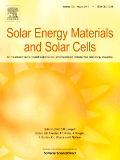
SOLAR ENERGY MATERIALS AND SOLAR CELLS
Advancing the Future of Solar TechnologiesSOLAR ENERGY MATERIALS AND SOLAR CELLS is a distinguished academic journal published by Elsevier, based in the Netherlands, focusing on innovative research in the fields of materials science and renewable energy. With a substantial history dating back to 1970, the journal has evolved into a premier platform for disseminating advanced studies related to solar energy technologies, including the development and optimization of solar cells and materials. Recognized for its high impact, the journal maintains a Q1 ranking across multiple relevant categories such as Electronic, Optical and Magnetic Materials, Renewable Energy, Sustainability and the Environment, and Surfaces, Coatings, and Films. It ranks impressively within the top tiers of Scopus, showcasing its influence and relevance in the scientific community. Although it does not offer open access, the journal remains a crucial resource for researchers, professionals, and students aiming to contribute to the advancement of sustainable energy technologies and materials innovation.

Advanced Energy and Sustainability Research
Advancing Sustainable Solutions for a Greener TomorrowAdvanced Energy and Sustainability Research is a leading open-access journal published by WILEY since 2020, dedicated to advancing knowledge and understanding in the realms of energy and sustainability. With an impressive impact factor and a commitment to high-quality, peer-reviewed research, this journal serves an international audience of researchers, professionals, and students passionate about addressing critical environmental challenges. The journal encompasses a wide array of topics within environmental science and energy fields, securing notable rankings in Scopus with top percentiles across several categories, including Ecology, Energy Engineering and Power Technology, and Waste Management. Given its open-access model, Advanced Energy and Sustainability Research facilitates the dissemination of cutting-edge research, enhancing accessibility and fostering collaboration within the scientific community. This journal not only plays a pivotal role in shaping public policy and industry practices but also aims to inspire innovative solutions for sustainable development in an increasingly complex world.
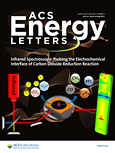
ACS Energy Letters
Advancing Energy Innovation for a Sustainable FutureACS Energy Letters, published by the American Chemical Society, is a prestigious peer-reviewed journal designed to disseminate innovative and impactful research in the multifaceted field of energy science. Since its inception in 2016, the journal has quickly ascended to a remarkable status, achieving Q1 rankings in critical categories including Chemistry (miscellaneous), Energy Engineering and Power Technology, Fuel Technology, Materials Chemistry, and Renewable Energy, Sustainability and the Environment as of 2023. With an emphasis on rigorous research methodologies and interdisciplinary collaboration, ACS Energy Letters serves as a vital platform for scholars, professionals, and students to explore cutting-edge research that addresses contemporary energy challenges. While maintaining a commitment to advancing knowledge without open access, it offers profound insights into sustainable practices and innovative solutions that are crucial for the future of energy systems globally. The journal's esteemed standing in the chemical and energy sectors underscores its significance, making it an essential resource for anyone invested in the advancement of energy technologies and sustainable practices.

NEW CARBON MATERIALS
Transforming Ideas into Carbon SolutionsNEW CARBON MATERIALS, published by Elsevier, is a leading academic journal that focuses on the innovative and multidisciplinary field of carbon materials research. With an ISSN of 2097-1605 and an E-ISSN of 1872-5805, this journal has established itself as a prominent platform for disseminating cutting-edge studies and applications in the realm of carbon nanomaterials, composites, and their industrial applications. Recognized for its high quality, NEW CARBON MATERIALS holds a Q1 ranking in the Materials Science category, reflecting its significant impact within the scientific community. The journal has continuously fostered knowledge exchange since its inception in 2004 and is set to further advance research until 2024. With a Scopus rank of #89 out of 463 journals in the General Materials Science category, this publication is essential for researchers, professionals, and students seeking to stay informed about the latest developments in carbon materials. While it is not an open-access journal, it offers various access options to ensure that the latest findings are available to a broad audience. By bridging the gap between theory and practical application, NEW CARBON MATERIALS is at the forefront of addressing critical challenges and paving the way for future advancements in materials science.
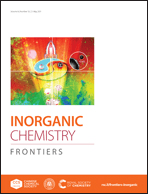
Inorganic Chemistry Frontiers
Bridging Theory and Application in Inorganic ChemistryInorganic Chemistry Frontiers, published by the esteemed Royal Society of Chemistry, stands at the forefront of advancements in the field of inorganic chemistry, boasting a prestigious Q1 ranking in its category as of 2023 and an impressive Scopus Rank of #3 out of 79, placing it in the 96th percentile. Since its inception in 2014, this journal has provided a robust platform for high-quality research that spans the diverse and rapidly evolving areas of inorganic chemistry. As an open-access journal, it ensures that the findings presented are readily accessible to researchers, educators, and practitioners globally, fostering an inclusive environment for the dissemination of knowledge. With its rigorous peer-review process, Inorganic Chemistry Frontiers aims to facilitate interdisciplinary dialogue and innovation, making it an essential resource for anyone dedicated to exploring the myriad applications and theoretical advancements within inorganic chemistry.
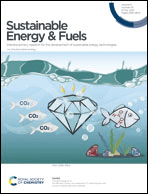
Sustainable Energy & Fuels
Empowering Sustainable Innovations in Fuel TechnologySustainable Energy & Fuels is a leading journal published by the Royal Society of Chemistry, dedicated to advancing knowledge in the fields of energy engineering, fuel technology, and renewable energy solutions. With its ISSN of 2398-4902 and notable Q1 status in both Energy Engineering and Power Technology as well as Fuel Technology, this journal ranks impressively in the Scopus database, ensuring a strong platform for disseminating impactful research. The journal spans a comprehensive scope aimed at addressing the global challenges of sustainable energy, including innovative methodologies and technologies that promote environmental sustainability. Although it operates under a traditional access model, the journal is committed to providing high-quality content that engages researchers, professionals, and students alike. With significant contributions expected through 2024, Sustainable Energy & Fuels stands at the forefront of facilitating scholarly communication, inspiring advancements in energy technologies that align with sustainability goals.

Electrochemical Energy Reviews
Illuminating Pathways to Sustainable Energy AdvancesElectrochemical Energy Reviews, published by SpringerNature, serves as an essential platform for the dissemination of cutting-edge research in the fields of electrochemistry, material science, and energy engineering. With an impressive impact factor and ranked in the Q1 category across multiple disciplines including Chemical Engineering and Energy Technology, this journal highlights its commitment to advancing knowledge and innovation within the energy sector. Operating since 2018, the journal not only provides a valuable resource for researchers and professionals but also invites contributions from students and emerging scholars interested in the pivotal role of electrochemical processes in sustainable energy solutions. Published in Germany and widely accessible to the global research community, Electrochemical Energy Reviews is an indispensable reference for those keen on exploring the future of energy technologies.

Energy Material Advances
Leading the Charge in Energy Material DiscoveriesEnergy Material Advances, published by the American Association for the Advancement of Science, stands at the forefront of energy research, showcasing groundbreaking studies in the realm of renewable energy, fuel technology, and materials science. With the journal's commitment to open access since 2020, it aims to democratize knowledge and foster innovation across a global community of researchers, professionals, and students. The journal boasts an impressive impact factor, placing it firmly within the Q1 category across multiple disciplines including Energy (miscellaneous), Fuel Technology, and Renewable Energy, Sustainability and the Environment, highlighting its significance in advancing scholarly discussions. In the latest Scopus rankings, Energy Material Advances ranks among the top 10% of journals in its field, affirming its role as a pivotal resource for current and emerging trends in energy materials. The journal is dedicated to facilitating collaborative efforts and inspiring novel approaches to the challenges posed by energy sustainability and technological advancement.
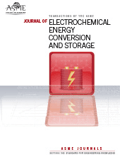
Journal of Electrochemical Energy Conversion and Storage
Transforming Energy Storage and ConversionThe Journal of Electrochemical Energy Conversion and Storage, published by ASME, is a premier platform for cutting-edge research in the fields of electrochemistry, energy engineering, and materials science. With an ISSN of 2381-6872 and an E-ISSN of 2381-6910, this journal aims to disseminate high-quality articles that contribute to the understanding and application of energy conversion and storage technologies. Notably recognized in the 2023 Category Quartiles as Q2 in multiple categories including Electronic, Optical and Magnetic Materials, Energy Engineering and Power Technology, and Mechanical Engineering, it reflects a strong academic impact within its field. The journal also boasts competitive Scopus rankings, highlighting its relevance and influence across disciplines. Operating under an open access model, the journal ensures that research findings are widely accessible, fostering collaboration and innovation among researchers, professionals, and students globally. As we move toward a more sustainable future, the Journal of Electrochemical Energy Conversion and Storage plays a critical role in advancing technologies that promise to reshape how we harness and utilize energy.
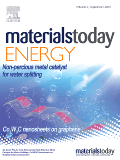
Materials Today Energy
Pioneering Research at the Intersection of Materials and EnergyMaterials Today Energy is a premier journal published by Elsevier, focusing on the interdisciplinary field of energy materials. With an ISSN of 2468-6069, the journal is renowned for its impactful research as evidenced by its impressive Q1 quartile rankings in multiple categories including Energy Engineering and Power Technology, Fuel Technology, and Renewable Energy. It stands out with strong Scopus rankings, highlighting its significance in the respective research communities, such as being ranked 3rd in Nuclear Energy and Engineering. Established from 2016 to 2024, the journal aims to provide a platform for innovative research that addresses the global demands for sustainable energy solutions. Although it is not open access, Materials Today Energy is accessible to a broad audience, encouraging collaborations among researchers, professionals, and students in the pursuit of advancing materials science and energy technologies. This makes it an essential resource for those looking to remain at the forefront of discoveries that shape the future of energy.